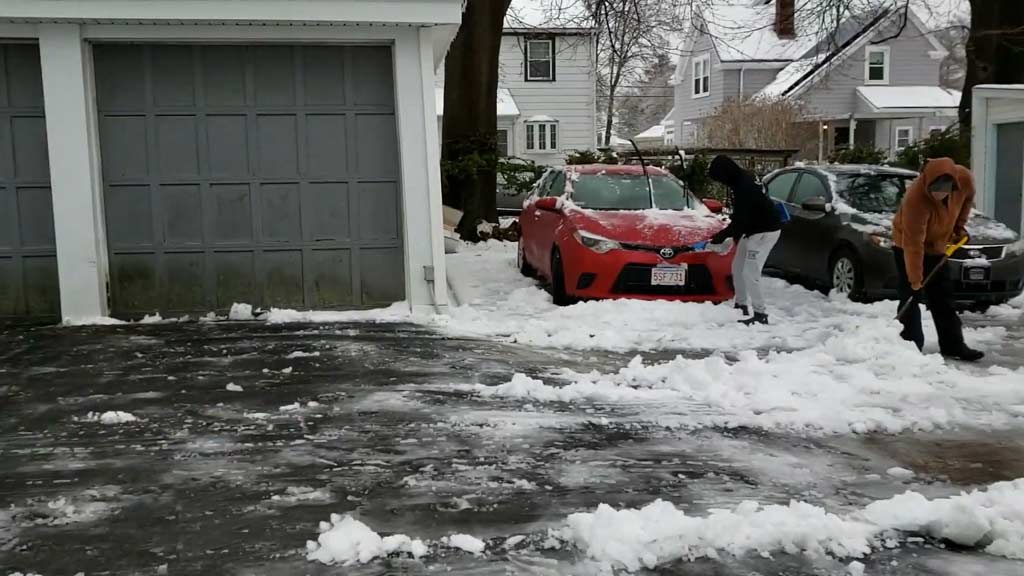When it comes to the weather in Boston, MA, snowfall plays a significant role in shaping the city's winter experience. Residents and visitors alike often wonder how much snow they can expect during the colder months. The average annual snowfall in Boston MA is a crucial metric for planning everything from travel to outdoor activities. Historically, Boston has experienced a wide range of snowfall amounts, with some years bringing record-breaking storms. Understanding this data not only helps in preparing for harsh winters but also provides insights into the city's climate patterns over time.
For those new to Boston or planning to visit, knowing the average annual snowfall in Boston MA is essential for understanding the local climate. The city's snowfall can vary significantly from year to year, making it an unpredictable yet fascinating aspect of life in New England. While some winters may see only light snowfall, others can bring feet of snow, challenging even the most seasoned residents. This variability makes Boston's winters a topic of constant discussion among locals and meteorologists alike.
As climate change continues to influence weather patterns worldwide, the average annual snowfall in Boston MA has become a focal point for researchers and weather enthusiasts. By examining historical data and current trends, experts aim to predict future snowfall patterns and their potential impacts on the city. This information is invaluable for city planners, businesses, and individuals who rely on accurate weather forecasts to make informed decisions.
Read also:Guns Roses History A Journey Through Rock And Rolls Most Iconic Band
What is the Average Annual Snowfall in Boston MA?
When people ask about the average annual snowfall in Boston MA, they are typically referring to the long-term trends observed over decades. According to historical data, Boston receives approximately 43 inches of snowfall annually. However, this figure can vary greatly depending on the specific weather patterns each year. Factors such as temperature, humidity, and atmospheric pressure all contribute to the amount of snowfall Boston experiences. Understanding these variables is key to grasping why some winters are snowier than others.
How Does Boston's Snowfall Compare to Other Cities?
While Boston's average annual snowfall boston ma ranks among the highest in the United States, it is not the snowiest city overall. Cities like Syracuse, New York, and Rochester, New York, often surpass Boston in terms of total snowfall due to their proximity to the Great Lakes. Despite this, Boston's snowfall is still significant and has a substantial impact on daily life. The city's infrastructure and emergency services are well-prepared for heavy snowfall, ensuring that residents can navigate the city safely even during the harshest winters.
Why is Snowfall Measurement Important for Boston Residents?
For Bostonians, knowing the average annual snowfall in Boston MA is more than just a matter of curiosity. It directly affects their daily routines, from commuting to work to planning outdoor events. Businesses also rely on accurate snowfall predictions to manage inventory and staffing during the winter months. Additionally, city officials use this data to allocate resources for snow removal and emergency services. In essence, understanding snowfall patterns is crucial for maintaining the quality of life in Boston.
What Factors Influence Boston's Snowfall?
Boston's snowfall is influenced by a complex interplay of meteorological factors. The city's location along the northeastern coast of the United States makes it particularly susceptible to Nor'easter storms, which are responsible for much of its snowfall. These storms draw moisture from the Atlantic Ocean and combine it with cold air from Canada to produce heavy snowfall. Other factors, such as El Niño and La Niña patterns, can also impact the severity and frequency of snowstorms in the region.
Can We Predict Boston's Snowfall Accurately?
Predicting snowfall accurately is a challenging task, even with the advancements in meteorological technology. While long-term forecasts can provide general trends, short-term predictions are more reliable due to the unpredictable nature of weather systems. Meteorologists use a variety of tools, including satellite imagery, radar, and computer models, to forecast snowfall. Despite these efforts, unexpected changes in weather patterns can still lead to deviations from predicted snowfall amounts.
How Has Climate Change Affected Boston's Snowfall?
Climate change has introduced new variables into the equation of Boston's snowfall. While some may assume that a warming planet would result in less snow, the reality is more complex. Warmer temperatures can lead to increased moisture in the atmosphere, which may result in heavier snowfall when conditions are right. However, the overall trend suggests that Boston's snowfall may become more erratic, with fewer but more intense storms in the future. This unpredictability underscores the importance of continued research and monitoring.
Read also:Unveiling The Love Island Usa Season 6 Cast Ages A Detailed Breakdown
What Are Some Record-Breaking Snowfall Years in Boston?
Throughout its history, Boston has experienced several record-breaking snowfall years that have captured the attention of the nation. The winter of 2014-2015 stands out as one of the most memorable, with over 108 inches of snowfall recorded. This extreme weather event tested the resilience of the city's infrastructure and highlighted the importance of preparedness. Other notable years include 1995-1996 and 2000-2001, both of which saw significant snowfall totals that disrupted daily life in Boston.
How Does Boston Prepare for Heavy Snowfall?
Boston's municipal services are well-equipped to handle heavy snowfall, thanks to years of experience and investment in snow removal equipment. The city employs a fleet of plows and salt trucks to clear roads and sidewalks, ensuring safe passage for residents. Additionally, emergency services are on standby to respond to any issues that may arise during severe weather. Public awareness campaigns also play a crucial role in educating citizens on how to stay safe during snowstorms.
What Should Visitors Know About Boston's Snowfall?
Visitors to Boston should be aware of the city's potential for heavy snowfall, especially during the winter months. Packing appropriate winter gear, such as warm clothing and sturdy boots, is essential for a comfortable experience. It's also wise to check weather forecasts before traveling and plan accordingly. In the event of a snowstorm, public transportation remains a reliable option for getting around the city, even when roads are impassable.
What Are the Long-Term Trends for Boston's Snowfall?
Looking ahead, researchers are closely monitoring long-term trends in Boston's snowfall patterns. While historical data provides valuable insights, the impact of climate change introduces uncertainties that require further study. Some projections suggest that Boston may experience fewer snowfall days in the future, but with the potential for more intense storms. This shift could alter the way the city prepares for winter weather and underscores the need for adaptive strategies.
What Role Does Snowfall Play in Boston's Economy?
Snowfall has a significant impact on Boston's economy, both positively and negatively. On one hand, winter sports and activities such as skiing and snowboarding attract tourists to the region, boosting local businesses. On the other hand, heavy snowfall can disrupt transportation and commerce, leading to economic losses. Balancing these effects requires careful planning and coordination among various stakeholders in the city.
What Can Residents Do to Prepare for Snowy Winters?
Residents of Boston can take several steps to prepare for snowy winters, ensuring their safety and comfort during the colder months. These include stocking up on essential supplies, such as food and medication, in case of prolonged power outages. Securing homes against the elements by insulating windows and doors is also important. Finally, staying informed through local news and weather updates can help residents make timely decisions during snowstorms.
Conclusion: Embracing Boston's Winter Wonderland
The average annual snowfall in Boston MA is a defining characteristic of the city's winters, shaping the lives of its residents and visitors alike. By understanding the factors that influence snowfall and preparing accordingly, Bostonians can embrace the beauty and challenges of their snowy winters. As climate change continues to reshape weather patterns, staying informed and adaptable will be key to thriving in this dynamic environment. Whether you're a lifelong resident or a first-time visitor, Boston's snowfall offers a unique glimpse into the wonders of winter in New England.
Table of Contents
- What is the Average Annual Snowfall in Boston MA?
- How Does Boston's Snowfall Compare to Other Cities?
- Why is Snowfall Measurement Important for Boston Residents?
- What Factors Influence Boston's Snowfall?
- Can We Predict Boston's Snowfall Accurately?
- How Has Climate Change Affected Boston's Snowfall?
- What Are Some Record-Breaking Snowfall Years in Boston?
- How Does Boston Prepare for Heavy Snowfall?
- What Should Visitors Know About Boston's Snowfall?
- What Are the Long-Term Trends for Boston's Snowfall?


